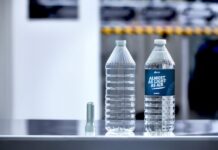Dortmund – Reducing the carbon footprint is high on the agenda of the beverage industry. In order to help achieve this goal, KHS has developed Loop LITE, a fully recyclable PET container for highly carbonated beverages, which significantly reduces the use of plastic over its entire life cycle.
The newly developed weight-reduced bottle1 is made of 100% rPET. Its ultra-thin FreshSafe-PET glass inner coating offers impressive freshness as well as quality protection without affecting the recyclability of the PET material itself. With its Nature MultiPack, the Dortmund-based system supplier relies on film-free secondary packaging. Caps (tethered caps) permanently attached to the bottle round off the holistic sustainability concept of KHS’ new system.
“As experts for holistic PET container systems, we continuously develop sustainable packaging designs that contribute to both the ecological as well as the economic goals of our customers,” says Vesela Helwes, sales expert for PET market development at KHS. “This includes, for example, particularly lightweight packaging that can be produced with a minimum amount of resources and recycled without compromise, thus contributing to the decarbonization of the industry. With our KHS Loop LITE, we have developed a new PET container concept that specifically addresses the specific needs of CSD beverage manufacturers and meets their high standards in every respect.”
Resource-saving and energy-efficient
Because of its specially developed design, the rPET packaging for highly carbonated beverages makes it possible to reduce the amount of material used by up to 25% compared to conventional branded CSD bottles on the market. The bottle body can be completely recycled and segregated by type. The innovative and particularly lightweight thread makes resource-conserving bottle production possible, and the permanently attached caps contribute towards achieving a 100% closed loop. In addition, they were able to secure an up to 30% reduction of the labeling materials. The special geometry of the newly designed rPET bottle base decreases the pressure required for the stretch blow molding process and can save up to 15% more energy and cut bottle production costs.
KHS technologies
KHS additionally relies on field-proven technologies for Loop LITE, which holistically emphasize the sustainability concept of the container due to its ultra-thin protective layer of silicon oxide (SiOx). FreshSafe-PET, for example, forms an effective barrier on the inner walls of PET containers. The flavor and carbonation are retained while at the same time preventing oxygen from entering the product to thus avoid the loss of vitamins and taste. With its innovative coating system that offers an environment-friendly alternative to PET bottles made of difficult-to-recycle composite materials, the new container concept makes it possible to lengthen the shelf life of bottled beverages by up to 26 weeks despite the significant reduction in weight. This is a great advantage, especially when transporting products over long distances. The container is designed to greatly increase the packing density for pallet transport. As a result, the carbon footprint of the packaging is reduced by up to 60% versus standard systems with bottles made of uncoated and new PET.
With the Nature MultiPack, one of the most sustainable types of secondary packaging on the market, KHS Loop LITE relies entirely on secondary packaging that is film-free. Instead of plastic film, the bottles are held together with dots of adhesive. This again noticeably reduces the amount of plastic used.
Ecological and economic advantages
“With the increasing cost of raw materials, the cost savings resulting from the substantially lower overall material usage are significant versus conventional solutions on the market. This is indicated in the calculation of the total costs, which we specifically point out in the course of discussions with customers,” says Helwes. KHS Loop LITE is of particular interest to brand name producers. “With our new marketable concept, we are systematically pursuing the course we are taking towards a circular economy. The line-compatible, non-returnable PET system not only represents a feasibility study, but also directly aids beverage bottlers in their quest to convert to an environmentally friendly and sustainable portfolio,” says Helwes.










